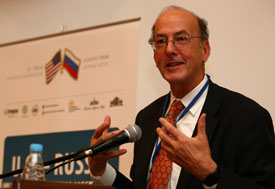Emerging economies provide new opportunities for research collaborations
January / February 2012 | Volume 11, Issue 1
Opinion by Dr. Roger I. Glass
Director, Fogarty International Center
The world's emerging economies provide exciting opportunities for us to develop new models of research collaborations that could rapidly advance scientific discoveries.
I recently toured research sites in India with HHS Secretary Kathleen Sebelius and NIH Director Dr. Francis Collins and was delighted to see the stunning resources there, both in terms of cutting-edge technology and highly qualified personnel. We have a long and rich history of research partnerships with India and are pleased to be expanding into new areas such as diabetes, neuroscience and low-cost technologies. In each of these new endeavors, both countries are paying their own way but sharing knowledge and leveraging resources as we work to achieve our common goals.
NIH has a similarly successful record of fruitful research collaborations with China. We recently launched a new partnership, the U.S.-China Program for Biomedical Research Cooperation. Each country is supporting its own scientific teams to conduct more than 30 joint research projects such as comparative population studies to help us better understand how to prevent disease and investigations of traditional medicines that may cure cancer.

Photo courtesy of the Foundation for the
National Institutes of Health
Fogarty director Dr. Roger I. Glass encouraged
US-Russia Forum participants to find areas of
common interest for joint research collaborations.
In Russia, we're pursuing a public-private partnership model to jointly study health issues of mutual interest including human development, healthy lifestyle, cancer, infectious diseases and rare diseases. Last November, I was pleased to participate in the first annual U.S.-Russia Scientific Forum in Moscow, a three-day scientific meeting with several hundred participants, organized by the Foundation for NIH. More than a dozen U.S. and multinational companies are supporting this activity, with some expressing an interest in funding training and capacity building programs in United States for Russian scientists. The Russian government has also pledged to fund research grants to advance our understanding of these critical health issues that affect both our populations.
Research training has been deemed a national priority in Brazil, where the government has announced it will support training for 75,000 Brazilian students in all areas of science and technology by 2016. Under that initiative, about 80 postdocs will come to the NIH campus for research training and collaboration. We're also exploring how we might partner with Brazil on joint research projects on topics of mutual interest through a funding program that would be jointly solicited and reviewed, with each side supporting its respective researchers.
These are just a few examples of how we're bringing the world's best minds - and the best ideas - to bear on the toughest health problems we all face. Through these partnerships, we not only increase our chances of finding solutions but also ensure the U.S. will remain a global leader in biomedical research.
More Information
To view Adobe PDF files,
download current, free accessible plug-ins from Adobe's website.